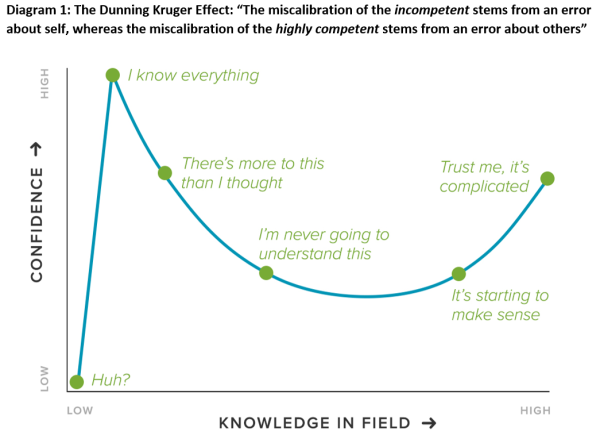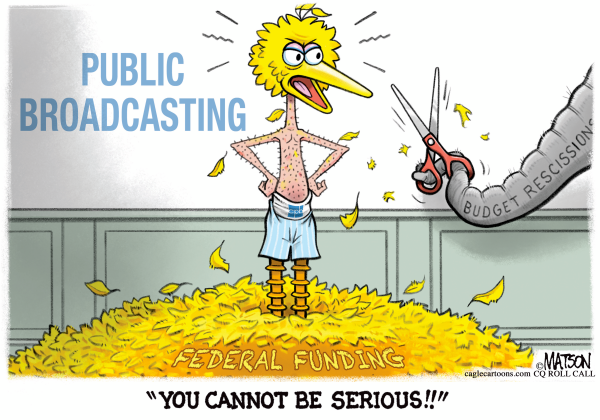I know a lot of smart people.
I also know a lot of people who think they're smarter than they are (even the smart ones ... or, perhaps, especially the smart ones).
It's common. So common, in fact, that there's a name for it. The Dunning-Kruger Effect.
Have you ever met someone who's so confident about what they think that they believe they know more than an expert in a field? That's the Dunning-Kruger effect. It's defined as a cognitive bias where a lack of self-awareness prevents someone from accurately assessing their own skills. It's getting increasingly more common.
Here's a graph that shows the general path a person takes on their journey towards mastery of a subject.
 via NC Soy
via NC Soy
It can be funny or frustrating to see (or be) the "victims" of this effect in our daily lives.
Humans seem prone to overestimating their knowledge and abilities. It's probably more a result of ignorance than stupidity.
Even if you are familiar with the cognitive bias caused by the Dunning-Kruger Effect, you are not immune to it — because you don't know what you don't know.
Two different ways that people get it wrong, first is to think about other people and it’s not about me. The second is thinking that incompetent people are the most confident people in the room, that’s not necessarily true.
Usually, that shows up in our data, but they are usually less confident than the really competent people but not that much... - David Dunning
It should be a reminder to reflect inward, not cast aspersions outward.
To close out, even this article on the Dunning-Kruger effect presents a simplification of its findings. First off, the above image isn't actually a part of the paper on the Dunning-Kruger Effect (though it is ironically so prevalent that people often report that it is). Furthermore, the connection between a lack of ability and the inability to engage in meta-cognitive tasks is intuitive, but it is not the only potential takeaway from the paper. It's worth a read if you have the time.
Regardless, I think it's clear we are all victims of an amalgam of different cognitive biases.
We judge ourselves situationally, and assume "the best" of ourselves. Meanwhile, we often assume "the worst" of others.
We can do better ... it starts with awareness.
Progress starts by telling the truth.

Digesting a Bigger Future
We live in a world where technology changes quickly and often, while human nature remains relatively unchanged.
For most of us, human nature is the key variable.
I suspect Henry Ford focused on that when he said, "Whether you think you can or you think you can't. You're right."
Processing the possibilities of tomorrow is often difficult for humans. Part of the problem is that we're wired to think locally and linearly. It's a monumental task for us to comprehend exponential growth, let alone its implications. For example, consider what happened to seemingly smart and forward-looking companies like Kodak, Blockbuster, and RadioShack.
The world changes quickly.
Change is constant. The wheels of innovation and commerce spin ever-faster (whether you're ready for it or not).
As a practical matter, it means that you get to choose between the shorter-term pain of trying to keep up ... or the longer-term pain of being left behind. Said another way, you have to choose between chaos and nothing.
It's hard to keep up – and even harder to stay ahead.
Personally, I went from being one of the youngest and most tech-savvy people in the room to a not-so-young person close to losing their early-adopter beanie. Sometimes it almost seems like my kids expect me to ask them to set my VCR so it stops flashing 12:00 AM all day.
My company may not be doing "rocket science", but it's pretty close. We utilize exponential technologies, such as high-performance computing, AI, and machine learning, to amplify intelligence and make data-driven, evidence-based decisions in real-time, all the time.
But, as we get "techier," I get less so ... and my role gets less technical, over time, too.
Due to my age, experience, and tendency to be a pioneer, I've been battling technology for decades.
Don't get me wrong, technology has always been my friend, and I still love it. But my relationship with it is different now.
I recognize that there are things that change and things that stay the same. And for me, the things that "stay the same" tend to be more important.
Paradoxically, the part of me that stays the same can still change and grow – that is how you become more (and a more evolved version) of that thing.
The Bigger Picture
My father said that not worrying about all the little details helped him see the bigger picture and focus on what was possible.
You don't have to focus on the technological details to predict its progress. Anticipating what people will need is a great predictor of what will get built. That means predicting "what" is often easier than predicting 'how'.
Why is that often the case? Because technology that solves a problem is more profitable and popular than technology searching for a problem to solve.
Here's a video from 1974 of Arthur C. Clarke making some remarkably accurate predictions about the future of technology.
via Australian Broadcasting Corporation
Artificial Intelligence, quantum computing, augmented reality, neuro-interfaces, and a host of exponential technologies are going to change the face and nature of our lives (and perhaps life itself). Some of these technologies have become inevitabilities ... but what they enable is virtually limitless.
Where do you see this going?
Onwards.
Posted at 09:22 PM in Business, Current Affairs, Film, Gadgets, Ideas, Just for Fun, Market Commentary, Personal Development, Science, Trading, Trading Tools, Web/Tech | Permalink | Comments (0)
Reblog (0)